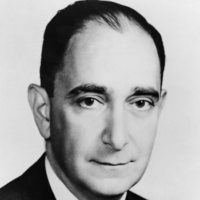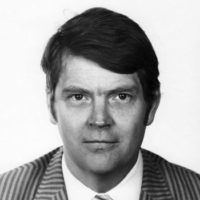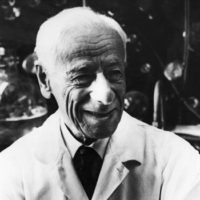
Robert Austrian
University of Pennsylvania School of Medicine

Emil C. Gotschlich
The Rockefeller University

Michael Heidelberger
New York University School of Medicine
For the development of a polysaccharide vaccine against pneumococcal diseases.
Robert Austrian
Pneumonia is the fourth-leading cause of death in the United States and caused 55,180 deaths in 1976. It is estimated that there are as many as 750,000 cases of pneumococcal pneumonia in our country every year, and that the economic cost of such pneumonias is a billion dollars annually.
Prior to the development of Dr. Austrian's vaccine, scientists had prepared less complex vaccines, using first, whole bacteria and later, capsular polysaccharides, but had had little success in achieving their acceptance.
When antibiotics came into use for the cure of pneumococcal infections, even these attempts were abandoned. But Dr. Austrian never lost sight of the fact that prevention is more important than cure.
The surveillance studies which he conducted revealed that despite antibiotic therapy, there were still, in the 1960s, almost half as many deaths from pneumonia in the United States as there were at the turn of the century. Dr. Austrian also established that persons over 50 years of age and those with chronic debilitating diseases were the largest group at risk.
In developing techniques for a pneumococcal vaccine, Dr. Austrian established that of 83 known types of pneumococci, 14 types were responsible for 80 percent of the pneumococcal infections in man, and that the outer coatings or capsules of these organisms should be included in an effective vaccine.
Dr. Austrian devised such a vaccine and then played a major role in the successful clinical trials which resulted in its licensure.
For his persistent, dedicated efforts which permitted the development of a vaccine that soon may significantly reduce human disease caused by the pneumococcus, this 1978 Albert Lasker Clinical Medical Research Award is given.
Michael Heidelberger
Acknowledged as the father of immunochemistry, Dr. Heidelberger is responsible for determining that the materials enveloping the virulent pneumococcal bacterium are carbohydrates. This determination led to greater understanding of one of the mechanisms by which invading bacteria develop in the body and cause disease.
Dr. Heidelberger further determined that the slimy materials which envelop the pneumonia bacteria are composed of complex chemical substances, made up of polysaccharides (sugars), and they cause the system to form antibodies that protect the body against pneumonia bacteria.
Dr. Heidelberger then validated the importance of his chemical and immunological discoveries by conducting, with others in 1945, clinical trials of a pneumococcal vaccine, which firmly established the tremendous potential value and efficacy of polyvalent polysaccharide bacterial vaccines.
For Dr. Heidelberger's pioneering work, which formed the basis for the subsequent successful development of today's practical vaccines against the pneumococcal diseases, this 1978 Albert Lasker Clinical Medical Research Award is given.
For the development of a polysaccharide vaccine against meningococcal diseases.
Emil Gotschlich
Meningitis is an inflammation of the layers of tissues covering the brain and spinal cord, and is a leading cause of acquired mental retardation. There are an estimated 20,000 cases of bacterial meningitis in the United States every year. The disease hits all age groups, especially infants and children, who are the most vulnerable.
When it was discovered that children, especially those between the ages of 6 and 12 months, are most susceptible to meningococcal diseases, because antibodies against meningococci are lowest at those ages, Dr. Gotschlich directed his efforts to methods of eliciting protective antibodies.
For this purpose, he devised innovative chemical techniques which permitted the development of an effective vaccine.
In 1969–70, a high incidence of meningococcal disease among army recruits afforded an opportunity to test this vaccine. It proved to be 90 percent effective, and its routine use, since 1971, for immunization in military training centers has almost completely eliminated meningococcal disease from this high-risk population.
For the first treatment of a polysaccharide vaccine to prevent meningitis which offers the bright hope that high risk populations of adults and children will, in the future, be spared the ravages of this disease, this 1978 Albert Lasker Clinical Medical Research Award is given.
